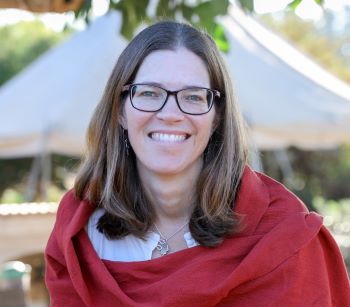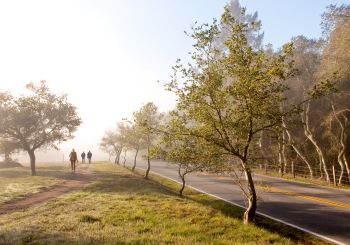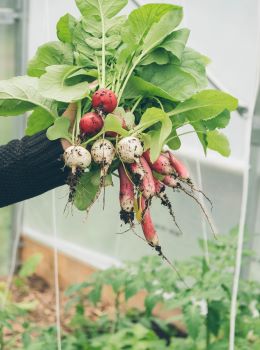For our February Sustainability Champion of the month, we have selected Stacy Philpott, the Executive Director of the Center for Agroecology and Sustainable Food Systems (CASFS), Professor in the Environmental Studies Department, and Alfred and Ruth Heller Chair in Agroecology! Throughout this interview we'll learn more about her research "at the intersection of agroecology and conservation biology", and her many awards and achievements.
Tell us a bit about yourself, your background, and how your path led to where you are today.
I am originally from Indianapolis, Indiana, studied Zoology and Music in college, and went to graduate school at the University of Michigan. I’ve lived in Indianapolis, IN, Seattle, WA, Ann Arbor, MI, Washington, DC, Toledo, OH, and now Santa Cruz. I’ve also spent about five years of my life doing research and volunteer work in Mexico and Central America. Most of my formal education and work experience is in ecology and a lot of my volunteer experience is with human rights. So I’ve always strived to find ecological research that has a human purpose or outcome which is why I think I gravitated to the field of agroecology for my career.
What do you do for fun?
I love to hike, bike, fly my kite, and cook.
You describe your research as “at the intersection of agroecology and conservation biology”. What does that mean?
Here’s my view of agroecology -- this is the integrative study of the entire food system, encompassing ecological, economic, and social dimensions. In order to create an ecologically sound, economically viable, and socially just food system, agroecology must integrate science and research, technology and practices, indigenous knowledge, and movements for social change. Agroecology is a transdisciplinary, participatory, action-oriented, and politically-engaged transformation of the food system. The foundations of agroecology come from a peasant social movement and exist today in food sovereignty movements across the world.
Here’s my view of conservation biology - this is the study of how to protect the world’s biodiversity at all levels of biological organization - from the genetic level to the level of ecosystems and biomes. Conservation biologists study how to protect, maintain, and restore species and biological processes, as well as policy changes that can better meet these goals.
 Many of the early conservation biologists argued that species and biodiversity conservation is best accomplished by creating protected areas, excluding people from those protected areas in order to make the most of our conservation goals. I’ve always argued that we should also try to make the most of our working or human-managed landscapes so that agricultural habitats can serve to both conserve biodiversity and also produce food. In other words, I’m trying to study how we can manage agricultural and food systems (or agroecosystems) in a way that maximizes food production and access as well as species conservation. I believe that these goals are compatible using agroecological management techniques and by driving social change.
Many of the early conservation biologists argued that species and biodiversity conservation is best accomplished by creating protected areas, excluding people from those protected areas in order to make the most of our conservation goals. I’ve always argued that we should also try to make the most of our working or human-managed landscapes so that agricultural habitats can serve to both conserve biodiversity and also produce food. In other words, I’m trying to study how we can manage agricultural and food systems (or agroecosystems) in a way that maximizes food production and access as well as species conservation. I believe that these goals are compatible using agroecological management techniques and by driving social change.
Can you tell us a little bit about the work you do in the Environmental Studies Department?
Sure! I am a professor in ENVS and have taught a few different classes here - Insect Ecology; Field Research Experiences in Agroecology and Food; Ecology and Society. I also sponsor a lot of interns and senior thesis projects. I have also led a handful of grant projects aimed at recruitment and retention of students who have been marginalized by our current educational system - providing scholarships for the study of and research in agroecology. I worked with the Department faculty and with staff at the Center for Agroecology and Sustainable Food Systems to create a new B.A. in Agroecology that launched in Fall 2020! That is a really exciting development for us and we hope will allow ENVS to recruit more students.  You also mention your goal to contribute to the “improvement of farmer well-being”. Could you elaborate on this goal?
You also mention your goal to contribute to the “improvement of farmer well-being”. Could you elaborate on this goal?
Well-being can be defined in a lot of ways - improvement in physical and mental health, happiness, economic security, safety, etc. I also work to understand the relationships between farm management practices and the well-being of farmers (and farm workers, gardeners, etc), and how participation in agricultural activities may improve well-being. For instance, I did a project with urban gardeners several years ago that documented all the well-being benefits they derive from participating in a community garden. They reported everything from having access to healthy organic vegetables, to being able to spend time outdoors with their families, to making new friends. Clearly, there are strong linkages between agroecology and farmer well-being. But it is important to also recognize that there is a lot of work to be done to assure that farmworkers are treated with respect and dignity, and that the farming practices that they are exposed to do not put their well-being at risk.
What are the most rewarding parts of your roles at UCSC?
I really love working with students and advising both undergraduates and graduate students on their research projects. I learn so much from my students, and hope that I provide them support in achieving their goals. Some of my past students are now farmers, professors, or county sustainability officers. It is very rewarding to see what students decide to do and how you’ve influenced their goals and next steps!
How have you been able to incorporate sustainability into your position?
I think that pretty much everything that I do relates to sustainability. Sustainability of our food system and agricultural systems, trying to augment the diversity of ideas in how we can achieve our sustainability goals by bringing in more voices, and in trying to coach students through difficult times in order to finish their studies with success.
I’ve read about your work in coffee agroecosystems. What exactly does that entail?
I’ve worked for about 20 years studying coffee agroecology. For me, that has mostly entailed traveling to Mexico to study how the management of coffee farms (organic vs. conventional, with trees or without trees) influences insect biodiversity and interactions. For example, I spent many years studying tiny ants that nest in hollow twigs on the coffee plants, and how the removal of shade trees or certain shade tree species influences which species are there, how those ants control coffee pests, and how interactions with ant parasitoids can influence the biological pest control. That means lots of time counting and observing insects, counting damaged coffee fruits, and walking up and down steep hills in tall rubber boots, getting poured rain on every afternoon, and trying to make sense of how it all works! It also has entailed getting to know some of the farm workers at the coffee farm, and gaining a much larger appreciation of how difficult their lives are, and how hard they work to bring us our daily cup of motivation.
You’ve won many awards and honors, including 2020’s Most Cited Article Award and 2011 Dion D Raftopoulos Award for Outstanding Research. Can you elaborate on the work you completed to earn these awards?
The Most Cited Article Award that I won in 2020 was for an opinion paper on which I was a co-author - entitled, “The city as a refuge for insect pollinators”. This paper was published in the journal Conservation Biology, the leading journal in this subject. For the paper, my specific role was to brainstorm ideas of what to include, and read and provide some comments about drafts of the journal article. In the opinion paper, we argue that cities may be important places for pollinator conservation and talk about some things that residents, gardeners, and city managers might do in order to promote bee conservation.
The 2011 Dion D Raftopoulos Award for Outstanding Research was an award that I received while I was at the University of Toledo as an Assistant Professor. My colleagues in the Sigma Xi chapter there wanted to recognize my many contributions to the scientific literature (publishing papers) and mentoring of undergraduate research at the institution. It was a great honor to get the award, and to have them recognize my hard work!
I’ve read that you’ve worked in Chiapas, Mexico. Would you care to share a bit about the work you did there with urban ecosystems?

I did a project there together with two professors at El Colegio de La Frontera Sur (ECOSUR) in San Cristobal de Las Casas. We ran a sort of exchange program - during spring break, I took a few grad students and a few undergrads to Chiapas, and in the summer, the professors from ECOSUR brought graduate students to undergrads to Santa Cruz. In the in-between months, we ran some (pre-zoom) videoconferences to get to know one another and share research ideas about agroeccology. For the field work, that was the same in both locations. We sampled ladybugs, did an experiment to study pest removal from urban gardens, and also did pollinator surveys in 12-20 gardens in each location. It was really fun to see how the gardens differed between Mexico and Santa Cruz.
What does sustainability mean for you?
Protecting our environment and the people who live in it for now and for generations to come.
